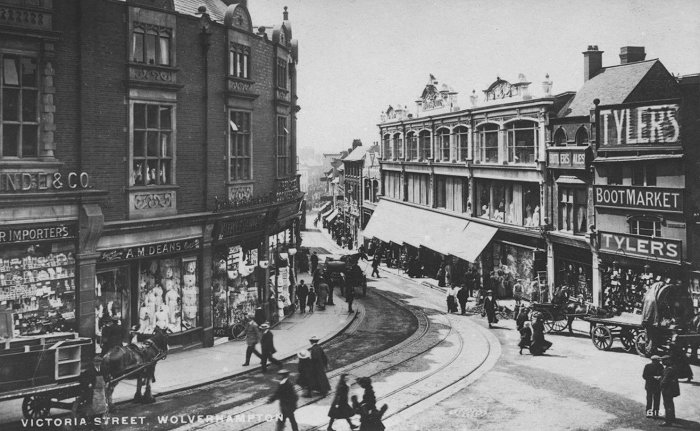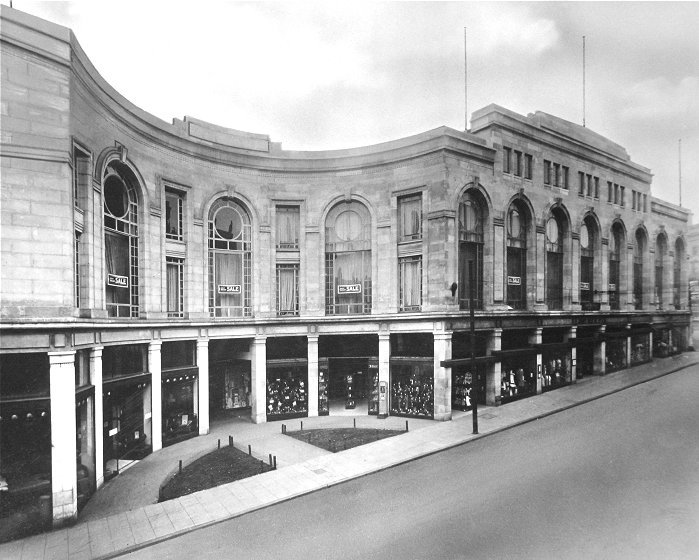|
 |
|
Into the 20th Century The enlarged store was a great
success and so Mr. Beattie decided to use all of the
space within the building to display products. Until
1901, the company provided lodging for the
employees, but this came to an end so that their
rooms could be used for the display of merchandise.
This marked the beginning of the department store. |
|

A view of the store in
1902. |
|

Beatties' departments
in 1906. From the Wolverhampton journal,
November, 1906. |
| The firm planned to extend the store
along Victoria Street and across to
Darlington Street and so on December 18th,
1909 Number 6 Darlington Street was
purchased, followed by Number 3 Darlington
Street on January 9th 1929. The shops at
Numbers 70 and 71 Victoria Street were
purchased from Mr. F. A. Willcock, chemist,
on January 1st, 1925. Two years earlier, the
firm had purchased the land at the back of
the Spread Eagle Inn. The expansion
continued and the business became
James Beattie Limited. The first Director's
meeting of the newly formed company was held
on
October 4th, 1921. The Directors decided
to lease by company's premises from James
Beattie senior for 21 years at annual rent
of £2,000.
|
|

The store in the
1920s From an old postcard. |
|

Relaying the tram
lines. |
|

From an old postcard. |
|
In July 1929 Victoria
Street was widened and Wolverhampton
Corporation purchased the Spread Eagle Inn.
Around that time, work was underway to
reconstruct numbers 71 to 78 Victoria Street
and Montague Burton Limited acquired the
corner plot between Victoria Street and
Darlington Street for the building of their
shop. Beatties then had a rental agreement
with Burtons for the land behind the shop
for 999 years.
|
|

The new frontage. |
|
James Beattie remained in control of
his store until just before his death on
May 31st,
1934. |
|

James Beattie. |
 |
James Beattie died a couple of weeks
before his 82nd birthday. His father was
born in Grantown-on-Spey, just to the north
of the Cairngorms, near the River Spey in
Scotland, where James often visited. When
there he enjoyed fishing and in his earlier
years sailing a yacht off the Scottish coast.
He
was a brilliant businessman, a member of St.
Peter's Lodge of Freemasons, a member of the
Wolverhampton Tradesmen's Association and
for a time a member of the Wolverhampton
Chamber of Commerce.
He had been married
to Sarah for 34 years and had a son and daughter and
a grandson, James Beattie junior, who had
taken the business over, before his
grandfather's death.
The family lived at Nethy House, Wergs Road, Tettenhall and they
were keen churchgoers at St. Michael and All
Angels Church, where his funeral service was
held.
He was buried in the church graveyard. |
|
In 1935 Beatties
acquired an extra site from Mander Brothers
on which to build showrooms, warehouses and
a new frontage in Victoria Street with large
display widows. It provided around 25,000 square feet
of space. There were modern lifts for the
upper floors, a bargain basement and
dispatch departments, along with cloakrooms,
staff toilets and a staff bicycle shed. The
building was designed by Lavender and Twentyman and built by Wilson Lovatt & Sons.
On the ground floor there were showrooms for
carpets, curtain fabrics, storerooms and
workshops. On the first floor was the
furniture showroom and on the second floor
was bedding and bedroom furniture, along with
a seven room bungalow to display furnishing
schemes.
The existing café was
greatly enlarged and the extension was
officially opened in April 1936 by the Mayor
of Wolverhampton.
On December 1st, 1936,
numbers 7 to 10 Darlington Street were
acquired and on September 16th, 1937 work
started on Beatties garage in Townwell Fold.
The land on the corner of Victoria Street
and Darlington Street was acquired from
Wolverhampton Council by gent's outfitters,
Montague Burton. The firm built the fine
corner building that still stands today. On
January 7th, 1938 the land that had been
previously rented behind Burton's shop was
purchased by Beatties.
James Beattie junior was appointed company
secretary in 1938. He became joint managing
director in 1948.
On the 8th March, 1939 the newly built
Darlington Street extension was opened by
Lord Dartmouth.
|
|

An advert from 1938
showing the company's clever marketing
strategy. |
| During the Second World War, the store
and the staff greatly helped with the war
effort. Part of the second floor was loaned
to the Air Ministry for the storage of
aircraft components and many of the staff
undertook various roles to support the
military and would be seen in the store
wearing their uniform. A number of them
volunteered for the local balloon barrage
unit. In the store was a Red Cross Shop that
sold gifts and merchandise to help fund the
war effort. |
|

From the 1949
Wolverhampton Handbook. |
|
Expansion continued. On
November 16th, 1953, a piece of land between
School Street, Skinner Street and Townwell Fold
was purchased by Beatties. This was followed by
the purchase of a two
storey warehouse in Victoria Passage on
February 24th 1954.
Also
in
1954, the company offered the sale of shares to
the public, turning it into a public limited
company. The name was then changed to James
Beattie Plc. The Beattie family maintained its
control of the company through a dual stock
setup to enable them to retain the majority of
voting rights.
More land in Townwell
Fold was purchased on September 28th 1955,
followed by the purchase of a piece of land
alongside School Street on May 22nd 1957 and
more land in Skinner Street on November 26th,
1959. |
|

Another view of the 1930s frontage
in Victoria Street. |
 |
|
 |
|
 |
|
Return to
The
Early Years |
|
Return to
the beginning |
|
Proceed to
The Later Years |
|